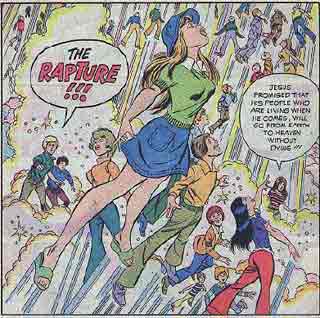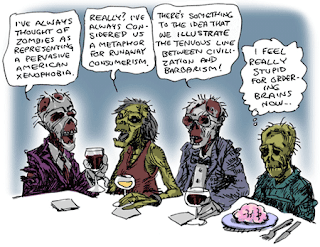Originally published at Am I the Only One Dancing?. Please leave any comments there.
 |
| Happy Zombies at KC Zombie Walk |
Did you hear? After tomorrow, those ofus who are disbelievers and sinners will have the world to ourselves. At least, that’s what one sub-group of a sub-group of a Christian sect believes. For the second time, apparently. (There have been several fascinating studies about the psychology of prophecy and what happens when the prophecy isn’t fulfilled – just note that the fact that the prophecy wasn’t fulfilled never convinces true believers that the prophecy was false – only that they either misinterpreted it or that their actions changed it somehow).
In other news, the CDC decided to havea little fun on their disaster preparedness page and postedinstructions for the coming Zombie Apocalypse. The right wing went ballistic, claiming it was a misuse of government funding, but I frankly don’t see how something that has gotten the CDC more hits on their website in the last several days than they’ve gotten in years could possibly be viewed as anything other than a brilliant ad campaign. That isn’t ‘misuse’, it’s brilliant and effective use.
‘The end of the world’ is a powerful trope. It has been a part of our collective unconscious throughout recorded history. Nearly every major world religion has a mythos that includes ‘the end times’, including religions that are at this point largely historical. In the 2000′s, the apocalyptic mythos grew to include fears of the very real monsters unleashed by new technologies, and created unreal monsters as containers for those fears. Notable among these monsters are King Kong , Godzilla
, Godzilla , and zombies.
, and zombies.
While Godzilla and King Kong speak to the fear of being overcome by a single huge, powerful force, zombies speak to a different fear – that of being swept up in a swarm of mindless drones and suffocated. Additionally, the zombie phenomenon addresses the fear that those we know and love will turn on us and devour us (and makes that fear literal).
So what does all this mean, politically? Those who believe in a literal apocalypse, where the skies open up and those who are ‘saved’ are sucked up from the earth like so many peas through a straw, have a tendency toward political policies that deny or discount long term political problems as an issue. It’s no coincidence that those least likely to believe in human-driven global warming, despite overwhelming scientific evidence, are most likely to believe in the Rapture (whether or not they believe it will come May 21, 2011). It is no coincidence that these same people discount claims that we are running out of fossil fuels and need to switch to more sustainable forms of energy.
I was asked to do a resume for an evangelical Christian of my acquaintance. When I asked her what her five year plan for her life was, she responded, “Oh, I never plan that far ahead. God could take us in the Rapture any minute.” I didn’t dare ask her how she justified shopping for groceries by the week. This is the same person who spent hundreds of dollars in preparation for Y2K, stocking canned goods and ammunition, and buying a generator.
When you believe your ‘real’ future isn’t here, with us, you’re not invested in it as deeply, other than to ensure that others believe as you do, so they too can get sucked up the divine straw. This is why the same people who are deeply opposed to government interference in large, societal issues are deeply in favor of government controls over individual actions, such as marriage, medical decisions (like abortion and birth control), the content of education, and similar issues.
On the other hand, the zombie apocalypse trope, while it has its ‘just plain fun and silly’ aspects, addresses a very different worry among those who pursue it (or in this case, ‘play with it’ might be a more appropriate term). It addresses several very real, very appropriate fears that stem from changes in technology in the last century. Whether you’re talking about the Romero zombies of the Night of the Living Dead , the pod people from the Invasion of the Body Snatchers
, the pod people from the Invasion of the Body Snatchers , or the Borg of Star Trek
, or the Borg of Star Trek fame, they all address the fear that we – or more often, those we know and love – are being sucked into a single consciousness and losing what makes us unique and special.
fame, they all address the fear that we – or more often, those we know and love – are being sucked into a single consciousness and losing what makes us unique and special.
This is a distinctly humanist fear, whether or not those who have it profess a faith. Note that in two of three of the examples above, (the Borg and the pod people) those who ‘belong’ profess that belonging to the collective is fulfilling and wonderful (the long story arch of Seven of Nine’s acceptance of being alone is an excellent portrayal of this) and in the third, the traditional zombie, there is no indication that the zombie is self aware at all. In a very real sense, the zombie movies express a fear of being used by the very same higher power idea that those who believe in the Rapture look forward to.
Is there a distinct conservative vs. liberal trend in these fears? Probably. I could bullshit you and extrapolate from numbers of evangelical Christians for the Rapture numbers, and I could probably give you some liberal fandom numbers for the second, but they would be gross approximations at best.
What I will say authoritatively is that humans have a strong need to manage our anxieties, and we often do this metaphorically, through stories. The stories we use to do so are often windows directly into our souls, telling anyone who looks what we’re most afraid of. Those who believe in the Rapture are most afraid of being left behind, while those who follow zombies are most afraid of being swept up. It’s a very, very interesting difference.

